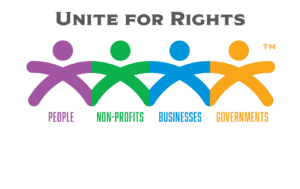(By Maya Forte, Unite Social Media Director)
This past weekend, on Saturday, April 5, over 500,000 people (a conservative estimate) gathered across 1,200 protest locations across all 50 US states, and in many cities and towns internationally, in support of the “Hands Off” movement. Hands Off is calling out governmental actions in the U.S., and elsewhere, rolling back important human rights mechanisms, such as funding for foreign aid, the United Nations, education, healthcare, social security programs, racism, environmental protection, climate change policy, the rule of law, and more.

Protest in Truckee, CA
Kirk Boyd/ Unite for Rights CEO
These protests were a powerful showing of far ranging demographic support for calling out human rights abuses and issues across the US and other countries. While there was considerable media coverage, one key factor many reports are failing to highlight is the high potential for growth of an international movement. This movement is underway.
The themes of hundreds of thousands of colorful posters in many cities and towns internationally rang clear as a callout for governments to respect human rights, international legal procedures and the rule of law.
Nonviolent protest is valuable. It is the people expressing their power over those who govern and is a fundamental part of American culture and law, as well as the cultures of many other countries.
After the protests, former Acting Director of U.S. Immigration and Customs Enforcement, Tom Homan, stated on television:
“They can protest a vacant house all they want,” … “Protests and rallies, they don’t mean anything,”

Juniper Tinker Ward with a homemade sign during Hands
Off protest in Oakland on April 5, 2025.
Aryk Copley /KQED
But is that really the truth? Populist, often authoritarian, leaders are rising across Europe and the Americas. In the Ukraine we see war being used to stifle and fragment democracy, and digital technology is being used to spread and propagate misinformation and disinformation – essentially propaganda. Should we be silent? Or is the picture above correct?
Amid a growing spiral into nationalism and self interest, should we be obsequiously acquiesce?
If you’re familiar with Unite for Rights’ mission and approach through our past blogs, you should already anticipate our answer to this question be a resounding no for multiple reasons. Protests and rallies have an immense importance and role in pro-democracy and pro-human rights action and movements; alongside being a human right embedded in the Universal Declaration of Human Rights, and Bills of Rights, such Article 1, Freedom of Speech and Expression, in the U.S. Constitution.
Protests like the Stonewall Riots in 1969, India’s 2021 Farmers Fight Back, Czechoslovakia’s Student Riots in 1989, the Women’s Suffragette Parades in 1913, and even the Boston Tea Party in 1773, all reflect the development of international norms of human rights through the demands of people in many countries. They have had huge repercussions for expanding people’s rights and liberties through legal and legislative action.
The right to protest is already recognised as an international human right for all, with many organisations like Amnesty International working hard to protect people’s right to protest across various mediums around the world.

Caption: The Destruction of Tea at Boston Harbor, Nathaniel Currier (1846)
D’Amour Museum of Fine Arts
Another point to recognise about the weekend’s protests was the important role of diasporic populations around the world in bringing attention to America’s deep democratic roots. These Americans living abroad are part of a kindred spirit for democracy, as is reflected by the local populations joining with them gathering across London, Paris, Berlin, and Lisbon.
With half of our Unite team based in London, we were able to see and feel firsthand the rallying cry for human rights and democracy by Brits and beyond. People took to the streets en masse to show their support and outrage, also reflecting their own concerns about increasing protectionary and nationalistic policies creeping into UK policymaking, especially in the area of international development and foreign aid spending.
Unite for Rights facilitates an international movement for people, nonprofits, businesses and governments to unite in these fragmentary times.
 It’s good to see the Hands Off movement growing internationally. This is not a time to sit silently in angst over what is happening to weaken human rights, democracy and environmental protections – let us turn our angst into action!
It’s good to see the Hands Off movement growing internationally. This is not a time to sit silently in angst over what is happening to weaken human rights, democracy and environmental protections – let us turn our angst into action!

Demonstrators protest against Tesla CEO Elon Musk outside the new Tesla dealership in London, Britain, April 5, 2025.
The engagement of the international community in Hands Off represents a unique aspect: Protests with a pro human rights focus can be applied to the increasingly nationalistic and conservative discourse bleeding across international relations. The incredible image of people across nationalities, identities, ages, and political affiliations coming together to call for greater human rights protections gives us at Unite for Rights an immense sense of pride and reinvigorates the necessity of safeguards like our International Bill of Rights, which can be applied to support and organise legal mobilisation around efforts like these.


Leave a Reply